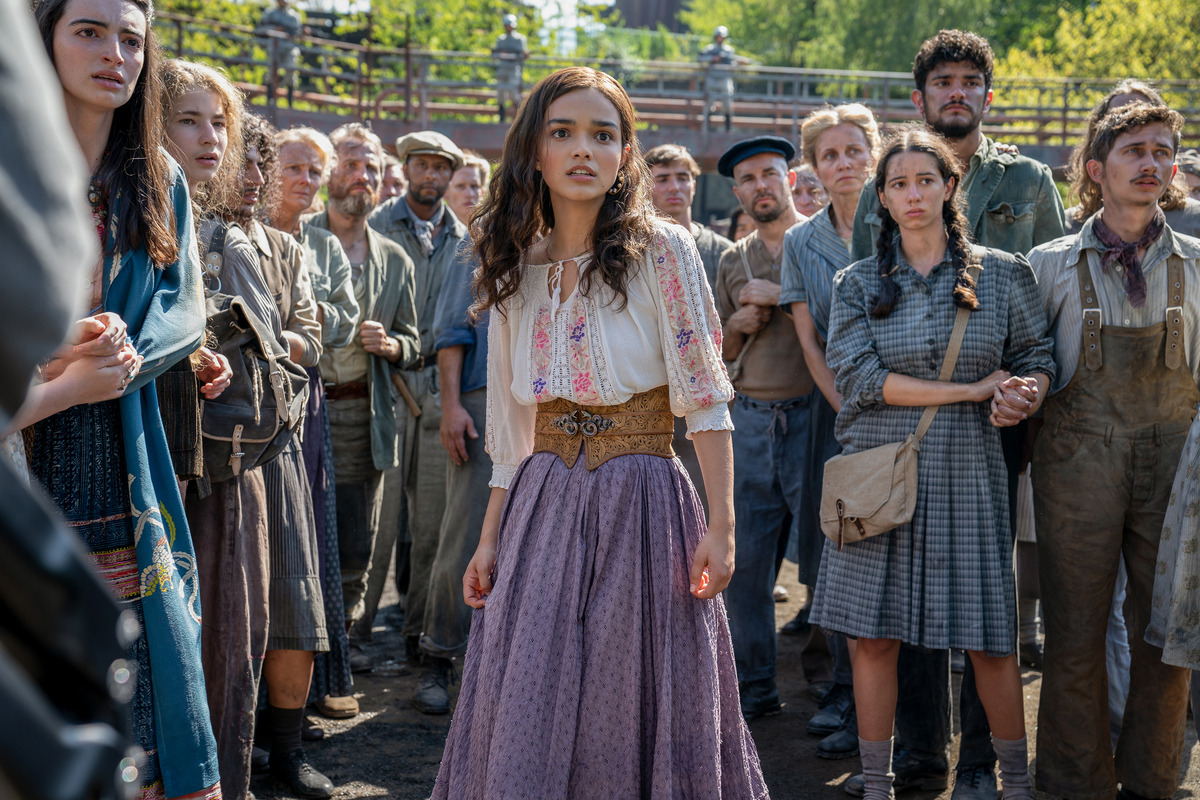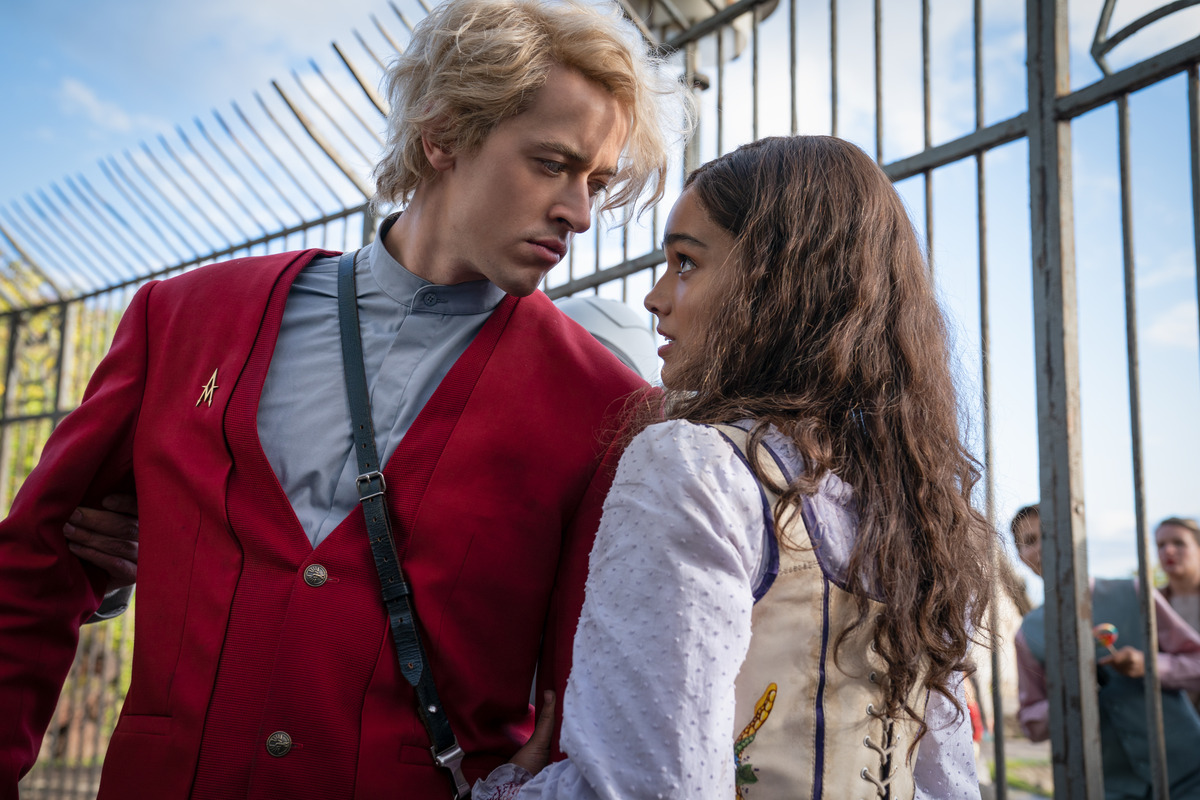The Hunger Games book franchise enraptured me soon before the film series began, so I read The Ballad of Songbirds and Snakes as soon it came out in book form. To returning director Francis Lawrence’s credit, this movie adaptation stays mainly true to the novel but loses some of its potential in the process.
The Hunger Games: The Ballad of Songbirds and Snakes represents the pinnacle of this series from start to almost finish. Everything from the action to the over-the-top drama to the musical moments shines. However, its execution feels hampered by an attempt to cover everything in under three hours.
Impeccable Chemistry
The Hunger Games: The Ballad of Songbirds and Snakes tells the story of President Snow 64 years before his reign of terror and Katniss Everdeen’s volunteer as tribute. It focuses on a young, charming, and torn Coriolanus Snow, played brilliantly by Tom Blyth, and his relationship with Rachel Zegler’s Lucy Gray.
I had some concerns about the casting heading into the movie due to past films I’ve seen these stars in, but the script, coupled with the heartfelt performances, sold me on their portrayal of the characters.
Snow and Gray command the screen in all of their scenes. Their chemistry is incredible, and it works well to convince the audience of their sudden but entrancing relationship. As expected, it gets a bit too melodramatic and serious sometimes, but the two leads feel far more engaging and three-dimensional than their counterparts six decades later.
Snow guides Lucy Gray as her sponsor for participation in an early Hunger Games, which she has little hope of winning. The story focuses on an intriguing time in the Capitol when the Games aren’t the spectacle they later become. This results in a grittier and somehow even more vicious battle to the death. It holds nothing back in its twisted and often mesmerizing imagery.
Faithful Adaptation for the Win

The Hunger Games: The Ballad of Songbirds and Snakes’ faithful adherence to the source material fascinated and gratified my heart. It rivals Catching Fire’s film adaptation in its honest and utmost attempt to capture the excellent original novel.
The film splits itself well across several acts, giving equal attention to the moments leading up to the Games and the actual bloody events of the tragedy. The exploration of Snow and Gray’s relationship and how her wild character changes him stays true to what I remember and then some.
In some ways, it even elevates and goes beyond what the source material did. Lucy Gray often felt at a distance in the books, and the screen adaptation gives her the central role she deserves. This makes it easier to understand her, and it helps that Zegler nails every scene, from the action-packed to her several welcome and catchy songs.
Unfortunately, this does mean the cast largely feels oft-forgotten outside of the two leads. This especially includes ones like Hunter Schafer and her role as Snow’s cousin Tigris, who feels even more ignored than in the book version.
The only exception to this is Viola Davis’ remarkable role as Dr. Gaul. She gives a rough and almost villainous edge to the film, which she brings to life much better than the confusing book version of the character.
Snow Deserved a Two-part Story

Snow’s origins are poetic, disturbing, and heartbreaking in The Ballad of Songbirds and Snakes. Unfortunately, this movie’s biggest flaw comes from not fully exploring the villain’s inner thoughts and motivations as well as the book did.
Sure, it’s understandable that a film can’t listen to every inner monologue he has, but the actual reason for this issue comes from the lack of time to truly see his character develop and change. Everything feels so rushed in an attempt to cover every crucial detail in the already lengthy runtime.
I hate to say it as someone who disdained the split of Mockingjay back in the day, but I knew reading the book that it was better served as a two-part film. This rings true in the actual adaptation with its lightning-fast pacing. To be fair, it gets the viewer from one point to another without much downtime to get bored, like in past entries.
That said, it does so at a great cost. This pacing means it loses some of the impact and understanding of the characters in the process. Due to Blyth’s performance, Snow still feels like a tragic villain, but his decisions become hard to understand. Without spoilers, the final act has this problem more than anywhere else.
The film spends so much time on the events leading up to the Games and the action of the brutal arena that it speeds through arguably the most important part of the story. In the end, this makes some of the sharp turns and character decisions much more jarring and unearned.
Ultimately, it left a bad taste in my mouth with the finale. This is a shame since the vast majority of the movie nails its ideas, even if the actual Games deserved a bit more time. But at least the actors give these scenes everything they have, considering the script’s limitations.
Wrapping Up
The Hunger Games: The Ballad of Songbirds and Snakes is the most faithful adaptation of a Suzanne Collins novel yet. Tom Blyth and Rachel Zegler are impeccable in their portrayals of the two leads. This movie nails the drama, action, and tragedy of this villainous origin story for the most part. Unfortunately, the rushed pacing of the longest book in the series holds it back from its potential as the best movie in the franchise.

